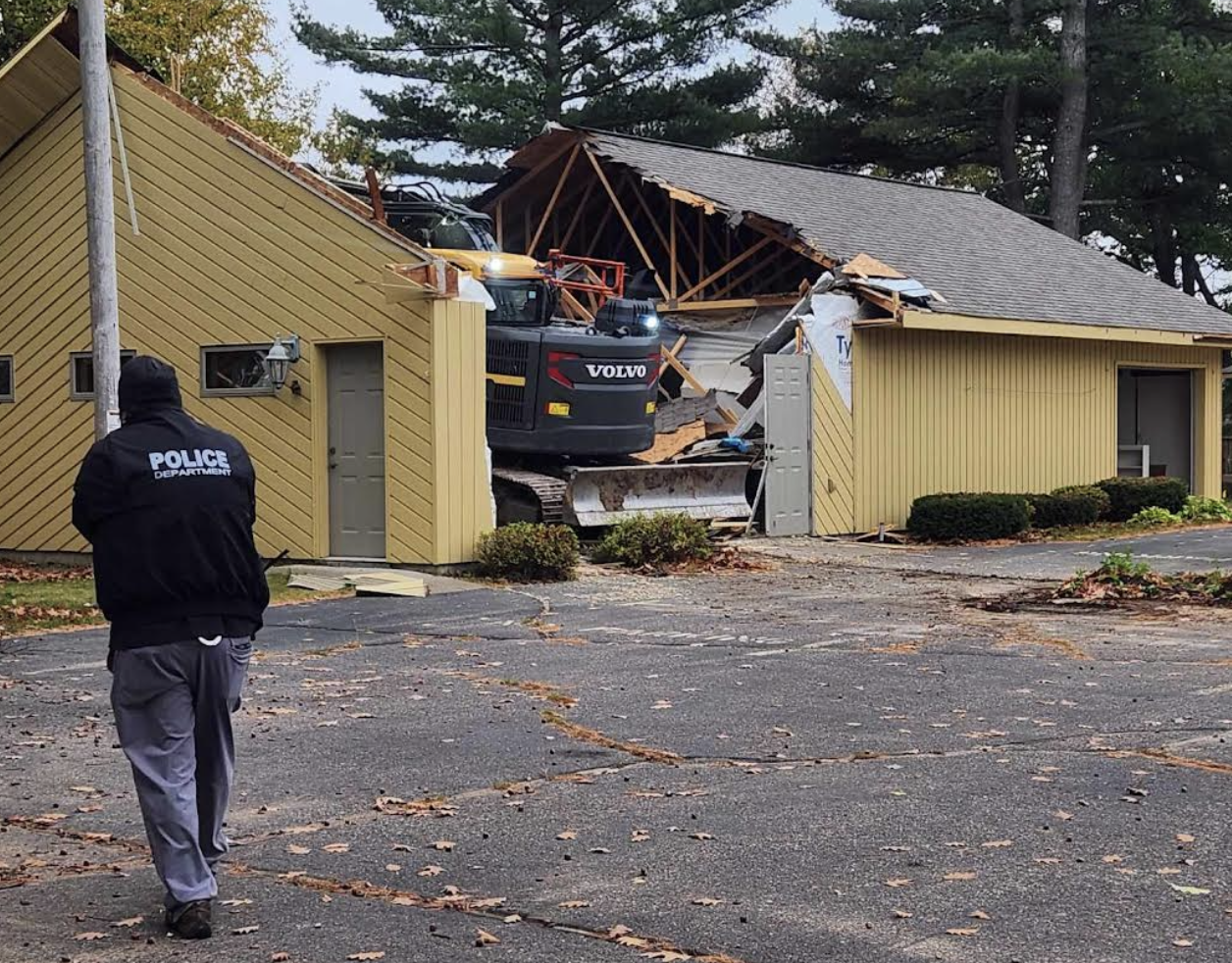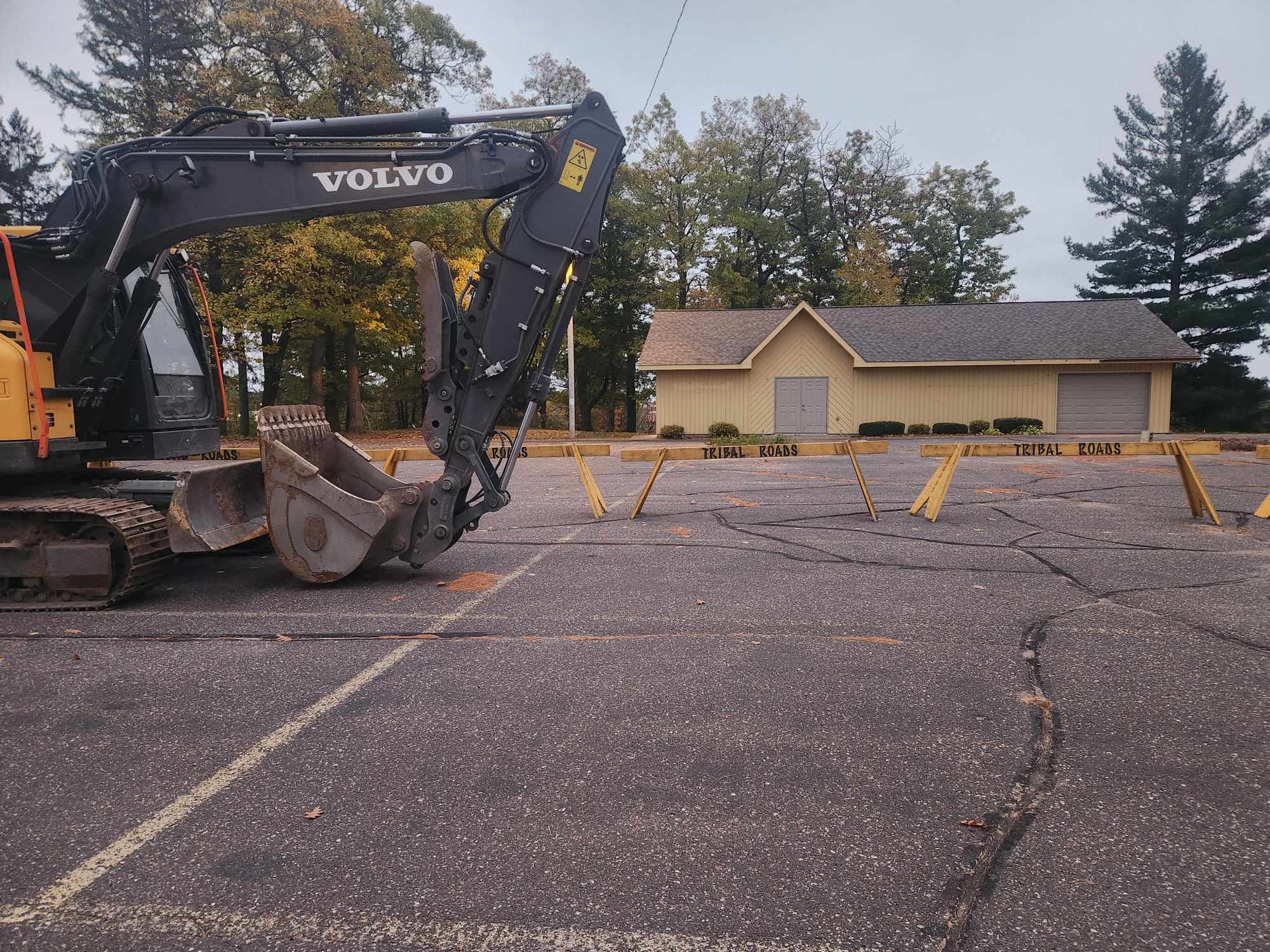
- Details
- By Darren Thompson
Demolition is underway at the Community Presbyterian Church on the Lac du Flambeau Indian Reservation after an unmarked grave site was identified on church property by the tribe’s historical preservation office in August. The demolition began on Monday morning.
Native News Online reported in August that the tribe initiated a ground-penetrating radar (GPR) survey in partnership with the Ho-Chunk Nation of Wisconsin’s Tribal Historic Preservation Officer, Bill Quakenbush, after a depression was discovered in the church’s parking lot.
Native News Online confirmed that the land is leased to the church by the Lac du Flambeau Band of Lake Superior Chippewa Indians, a federally recognized tribe in northern Wisconsin.
Three areas of the parking lot were removed, for the purpose of testing the soil of possible human remains. One of them showed positive results of human remains, and then a portion of the parking lot and an additional building were closed off out of respect for the grave identified under the parking lot.
The tribe issued a statement in August saying that it would not be exhuming any human remains that are discovered under the church’s parking lot. The church property has been surveyed in the past, but not with GPR and the location of the depression is the only location where the GPR was used.
Since the human remains will not be exhumed, the parking lot has been reduced by approximately one-third of its size.

A portion of the church parking lot has been permnantly closed. (Photo/Courtesy)
The tribe announced on September 22, 2023 that the Presbyterian Church agreed to remove the building near the location of where human remains were found under the church parking lot. A structure known as “The Attic," a resale shop, and a portion of the church’s parking lot will be demolished by the Lac du Flambeau Band of Lake Superior Chippewa Indians’ Tribal Roads Department. The tribe has not issued a statement in regards to the demolition today, or any other matter regarding the effort by church leadership to stall the demolition.
The original church was built at the site in 1898. The building was replaced with the current church in 1995. “The Attic” was later built in 2001.
At least one unmarked grave was discovered under the parking lot and that was enough to schedule demolition near the identified grave site. The tribe scheduled the demolition to begin today, and local church leaders pleaded with the Lac du Flambeau Tribal Council to postpone demolition, saying that the removal of one of its structures would eliminate its main source of revenue.
The tribe has not responded to inquiries on whether or not there will be a replacment of the retail shop.
“The Attic has closed for the season a couple of weeks earlier than expected due to the parking lot being cordoned off, and the resulting inability to access the building,” the Community Presbyterian Church said in its September newsletter. “This means sadness for staff and clients alike as well as a diminished amount of money to distribute in missional ways for 2023.”
The tribe said that it plans to replace the removed area of the parking lot with more grassy areas more appropriate for their ancestors’ final resting place. The church’s pastor, Timm High, resigned September 15, 2023 and transferred to another location, according to the church’s website. The church is in search of another pastor. The church did not disclose if the former pastor's transfer was related to the human remins discovery.
More Stories Like This
The Prediction Market Boom is Posing an Existential Threat to American Indian GamingNARF Condemns ICE Actions, Says Native Americans Unlawfully Detained
United Indian Nations of Oklahoma Urges Tribal Citizens to Carry ID Amid ICE Enforcement Actions
Oglala Sioux Tribe Rejects ICE Conditions for Information on Detained Members
Supreme Court Victory Secures Alaska Native Subsistence Fishing Rights
Help us defend tribal sovereignty.
At Native News Online, our mission is rooted in telling the stories that strengthen sovereignty and uplift Indigenous voices — not just at year’s end, but every single day.
Because of your generosity last year, we were able to keep our reporters on the ground in tribal communities, at national gatherings and in the halls of Congress — covering the issues that matter most to Indian Country: sovereignty, culture, education, health and economic opportunity.
That support sustained us through a tough year in 2025. Now, as we look to the year ahead, we need your help right now to ensure warrior journalism remains strong — reporting that defends tribal sovereignty, amplifies Native truth, and holds power accountable.
 The stakes couldn't be higher. Your support keeps Native voices heard, Native stories told and Native sovereignty defended.
The stakes couldn't be higher. Your support keeps Native voices heard, Native stories told and Native sovereignty defended.
Stand with Warrior Journalism today.
Levi Rickert (Potawatomi), Editor & Publisher

